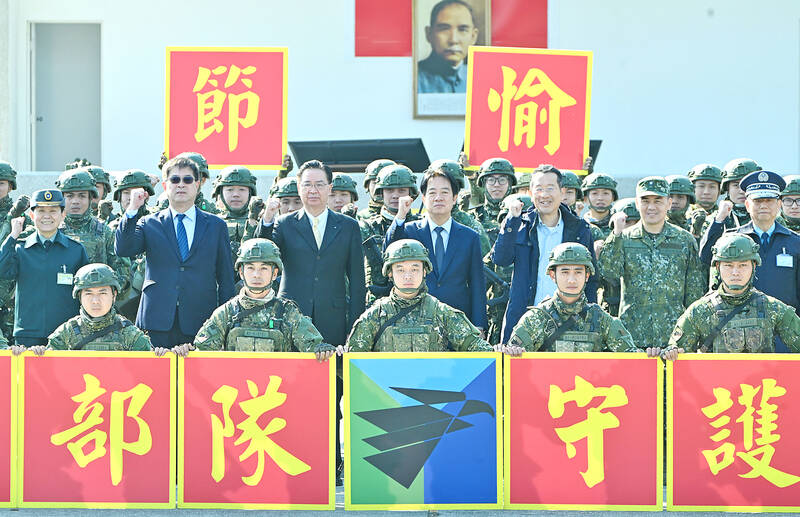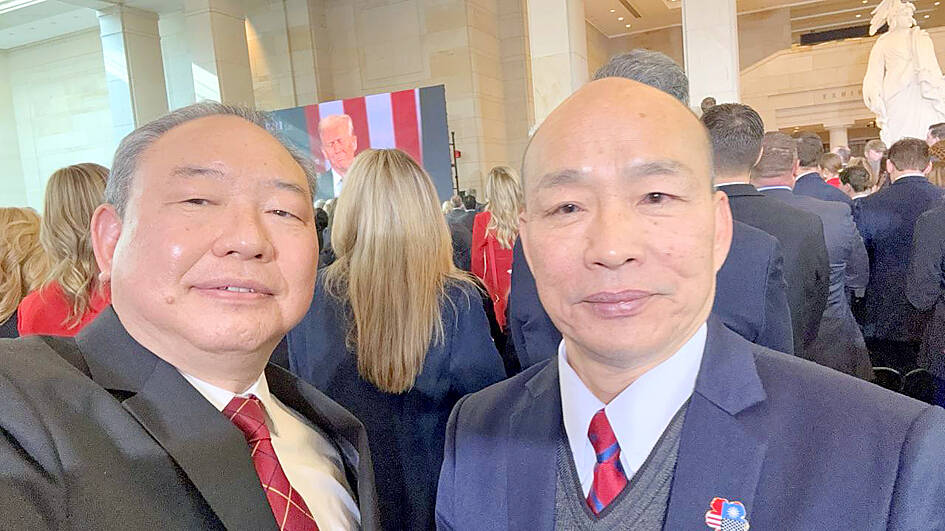President William Lai (賴清德) yesterday congratulated Donald Trump on his inauguration as the US’ 47th president, saying Taiwan looks forward to working with the new administration.
“Sincere congratulations to @realDonaldTrump & @JDVance on your inauguration as #POTUS & #VP. #Taiwan looks forward to working with your administration to promote enduring freedom, peace & prosperity around the world. We wish you great success in the years ahead,” Lai wrote on X.
Taiwanese officials had been invited to attend the inauguration ceremony outside the Capitol, but due to the frigid weather, the ceremony was moved inside to the Capitol Rotunda, significantly reducing the number of attendees, including Taiwan’s delegation, the Taipei Economic and Cultural Representative Office (TECRO) in Washington said.

Photo: Tien Yu-hua, Taipei Times
Through the joint efforts of the Ministry of Foreign Affairs (MOFA), TECRO and the US government, Legislative Speaker Han Kuo-yu (韓國瑜) and Representative to the US Alexander Yui (俞大?) were able to watch the inauguration via livestream in the Emancipation Hall of the Capitol Visitor Center, MOFA spokesman Hsiao Kuang-wei (蕭光偉) said.
The other seven members of the cross-party lawmakers’ delegation led by Han were able to watch the livestream in a VIP box in the Capital One Arena, he added.
The arrangements demonstrated the important results of the long-term hard work in strengthening Taiwan-US relations and establishing connections with Taiwan-friendly people, Hsiao said.

Photo: CNA
Lawmakers on the delegation praised the ministry and the representative office in the US for proactively dealing with the unexpected changes, and their praise is the greatest encouragement to frontline co-workers, but it was achieved because there are MOFA resources to maintain Taiwan-US relations, he said.
The Legislative Yuan’s decision to significantly cut and freeze the ministry’s budget this year would seriously affect diplomatic work, he added.
Speaking to reporters after the event, Han acknowledged that Trump emphasized “America First” in his inaugural speech.
Han called for more collaboration between the US and Taiwan, which has a global edge in semiconductors and high-tech industries, saying it would be mutually beneficial.
Yui said the Taiwanese delegation’s participation at the inauguration went well and demonstrated that “Taiwan was not absent.”
Taiwan will continue to build on the existing foundation to promote exchanges and collaborations with the Trump administration across various fields, TECRO said, while thanking the US for its arrangements for the Taiwanese delegation.
In Taipei, Deputy Legislative Speaker Johnny Chiang (江啟臣) yesterday said that Trump’s foreign policy might signal a reshuffling of the global order that requires agility and flexibility for Taiwan to navigate.
Taiwan might need a “Taiwan first” policy in response to Trump’s America first, he said.
Republicans’ majority in the US Senate and House of Representatives meant Trump could reshape international trade, the global geopolitical landscape or reshuffle the international order virtually without constraint, he said.
In his inaugural speech, Trump renamed the Gulf of Mexico to Gulf of America, while claiming to wish to be a peacemaker and unifier, showing that the returning president meant to implement his campaign platform, Chiang said.
Trump emphasized boosting US manufacturing via tariffs and steering away from foreign military entanglements, suggesting that the US and China would continue to compete without war, he said.
The remarks also indicated that the global geopolitics might change significantly under Trump to impact Taiwan’s relations with China and the US and their trilateral relationship, as well as the stability of the Indo-Pacific region, Chiang said.
As the sixth-largest contributor to the US trade deficit, Taiwan should be prepared for possibly facing tariffs, he said.
The use of tariffs as weapons, transactional relationships and continued dialogue would likely mark the Trump administration 2.0’s handling of foreign affairs, he said.
Additional reporting by Liu Wan-ling

Right-wing political scientist Laura Fernandez on Sunday won Costa Rica’s presidential election by a landslide, after promising to crack down on rising violence linked to the cocaine trade. Fernandez’s nearest rival, economist Alvaro Ramos, conceded defeat as results showed the ruling party far exceeding the threshold of 40 percent needed to avoid a runoff. With 94 percent of polling stations counted, the political heir of outgoing Costa Rican President Rodrigo Chaves had captured 48.3 percent of the vote compared with Ramos’ 33.4 percent, the Supreme Electoral Tribunal said. As soon as the first results were announced, members of Fernandez’s Sovereign People’s Party

MORE RESPONSIBILITY: Draftees would be expected to fight alongside professional soldiers, likely requiring the transformation of some training brigades into combat units The armed forces are to start incorporating new conscripts into combined arms brigades this year to enhance combat readiness, the Executive Yuan’s latest policy report said. The new policy would affect Taiwanese men entering the military for their compulsory service, which was extended to one year under reforms by then-president Tsai Ing-wen (蔡英文) in 2022. The conscripts would be trained to operate machine guns, uncrewed aerial vehicles, anti-tank guided missile launchers and Stinger air defense systems, the report said, adding that the basic training would be lengthened to eight weeks. After basic training, conscripts would be sorted into infantry battalions that would take

EMERGING FIELDS: The Chinese president said that the two countries would explore cooperation in green technology, the digital economy and artificial intelligence Chinese President Xi Jinping (習近平) yesterday called for an “equal and orderly multipolar world” in the face of “unilateral bullying,” in an apparent jab at the US. Xi was speaking during talks in Beijing with Uruguayan President Yamandu Orsi, the first South American leader to visit China since US special forces captured then-Venezuelan president Nicolas Maduro last month — an operation that Beijing condemned as a violation of sovereignty. Orsi follows a slew of leaders to have visited China seeking to boost ties with the world’s second-largest economy to hedge against US President Donald Trump’s increasingly unpredictable administration. “The international situation is fraught

GROWING AMBITIONS: The scale and tempo of the operations show that the Strait has become the core theater for China to expand its security interests, the report said Chinese military aircraft incursions around Taiwan have surged nearly 15-fold over the past five years, according to a report released yesterday by the Democratic Progressive Party’s (DPP) Department of China Affairs. Sorties in the Taiwan Strait were previously irregular, totaling 380 in 2020, but have since evolved into routine operations, the report showed. “This demonstrates that the Taiwan Strait has become both the starting point and testing ground for Beijing’s expansionist ambitions,” it said. Driven by military expansionism, China is systematically pursuing actions aimed at altering the regional “status quo,” the department said, adding that Taiwan represents the most critical link in China’s